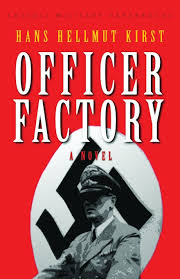The Officer Factory (1960) by Hans Hellmut Kirst
Good Reads meta-data is 1000 (!) pages rated 4.29 by 412 raters litizens.
DNA: Nazi Germany.
Genre: War.
Verdict: Glacial.
Tagline: Ideology über alles.
Somewhere in 1944 Thuringia* is an Wehrmacht officers’s school preparing a new crop for the Eastern Front. Supervising and training these candidates are veterans, most of whom seem to be intact in January of 1944. The instructors work under the baleful eye of the General who is commandant of the installation.
The routine of this army base is upset by the death of one of the instructors, which is where the story begins. The death is treated as an accident. In a mine-setting demonstration a defective fuse ignited and killed the officer. Ranks seem to have closed over that explanation.
But as with such an artificial environment there are wheels within wheels, personal and petty rivalries abound. Beneath the ordered surface is a disordered reality.
Spoiler.
But no, not everyone accepts that account. In part this satire is also a detective story. And an informal but sanctioned investigation follows. It opens a can of many worms, and the disciplined and ordered facade of the school is shattered to reveal the corruption within it.
***
The opening scene at the funeral is superbly rendered, and the characterisation of the General then, and later is memorable. He is an honest man in a dishonest world.
However, I found it hard going. The combination of painstaking detail and doomed irreverence of the central character and some others seemed out of place, unless it was intended to be gallows humour, and it left me confused.
Moreover, the insertion of backstories of the many characters as CVs disrupts the momentum, and adds little. I read the first few CVs and found they added nothing to my appreciation of the characters or plot and flipped over the remainder. No doubt my loss in there somewhere.
Vice triumphs over virtue both during the war and after on this telling. It is indeed negative.
Finally, it was a torte too rich in that it is over-plotted: there is just so much going on that I lost the thread more than once. Life, of course, is like that, but stories must abstract from that to allow concentration, and in this novel my concentration was fractured. It is as long as War and Peace but without the epic dimensions.
Yet it remains that it is superbly written, rigorously developed, and compelling despite these qualifications. I am tempted to try one of the four novels in his Gunner Asch sequence.
Hans Hellmut Kirst joined the Wehrmacht in 1933 and became a lieutenant and political commissar (Führungsoffizier) who soldiered in Poland and France. Only slowly did he realise that he ‘was in a club of murderers.’ He published forty-six books, most novels, and many of those about honest men trying to remain human in a sea of corrupt criminality. None of them survive, just as the General and his agent do not in the book discussed above.
The most famous of his books in The Night of the Generals. After the war he was a persistent publicist for German war guilt, especially in Poland.
Ben Pastor cited him as the inspiration for the Martin von Bora series.
*Thuringia has a claim to be being the birthplace of Nazism.

